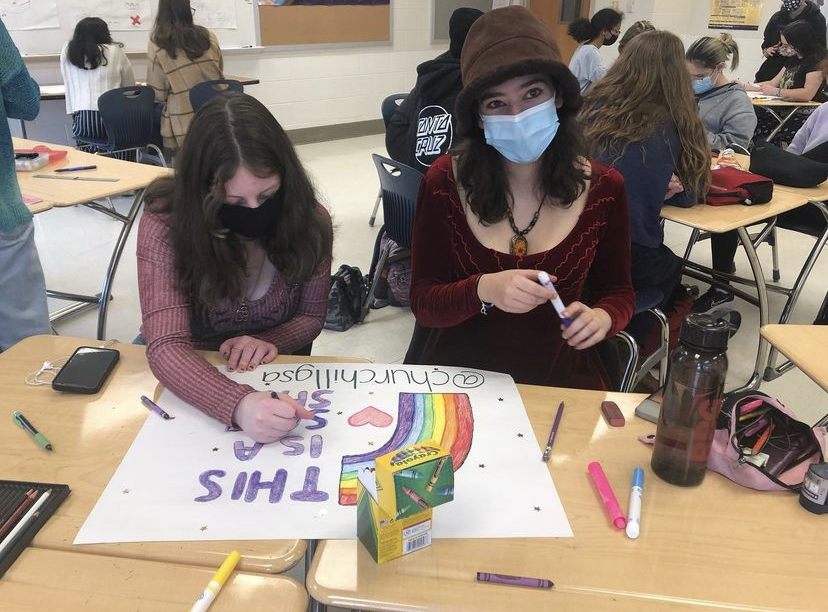Gender identity sets its presence in classrooms
The WCHS GSA’s club meetings are meant to provide a safe space for all students to be themselves. Meetings include making GSA posters, playing board games, and making new friends.
October 20, 2022
When Florida’s ‘Don’t Say Gay’ bill was announced, students thought it was the peak of anti-LGBTQ+ hate in schools. Since then, however, the number of states that ban transgender students from participating in sports consistent with their gender identity has risen to 18. Furthermore, approximately 300 anti-LGBTQ+ bills are currently being considered by state legislatures nationwide. With the rights of LGBTQ+ students being endangered across the U.S, what is Montgomery County doing to protect its students?
In September 2021, Montgomery County released their ‘Guidelines for Student Gender Identity in Montgomery County Public Schools,’ an 18-page document that provides guidelines for MCPS faculty regarding student gender identities. In particular, students’ rights to privacy are emphasized; it stipulates that school staff members are not authorized to disclose a student’s gender identity status to others, including parents and guardians. This publication was the result of years of effort by MCPS students, guardians, and staff to create more concrete protections against discrimination on the basis of gender identity or sexual orientation.
MoCo Pride Youth, a student-led, county-wide queer advocacy organization, has successfully worked to amplify the voices of LGBTQ+ students and allies in MCPS policy-making. They celebrate that having these privacy guidelines and the case-specific Gender Support Plan to support individual students has created the foundation for improved support systems in schools. Students have reported that it is easier to report situations where their identities are not respected and find productive solutions.
“The existence of one common plan between all schools means that there is significantly less room for well-meaning error,” Cedar Dwyer, the president of MoCo Pride Youth, said. “When teachers and faculty know how they should respond to a transgender student – [for example] “Can I use this name/pronouns for communications home?”– that makes students far safer to be themselves in school.”
While MoCo Pride Youth celebrates the progress, they underscore that this one document certainly does not mean that the issues within MCPS have been fixed. Although the guidelines are more comprehensive than before, translating the policies from paper to real-world changes is not a smooth process.
“Even now, I find that after I tell teachers and other faculty that I am transgender, they immediately begin to misgender me more than they did before being informed,” Dwyer said. “I know classmates whose identities, both sexuality and gender, have been the focus of rude or inappropriate comments from both students and faculty in schools.”
As discussions about what the next steps are, it is essential to recognize that the road to making these changes was not without obstacles, and there has been some notable pushback since then as well. In late 2020, parents of two MCPS students filed a lawsuit against MCPS claiming that the guidelines violated their constitutional rights to their child’s information. Although the case was dismissed, it demonstrated that even in a county widely viewed as progressive, students’ gender identities can be a divisive topic.
“To be frank, the type of parents who would feel a motivation to file a lawsuit of this nature are the reason these guidelines have to exist in the way that they do,” Dwyer said. “I would tell those parents that if they were supportive, unconditionally accepting parents, they would not be pursuing this fight. I would tell them to address their own biases, because no one is suffering more from the bigotry they are acting on than their own children.”
At WCHS, there are signs of support for the LGBTQ+ community around the school, and the administration emphasizes yearly through Bulldog Pride presentations and announcements that all identities should be respected. Regardless, there are still black spots that need to be addressed. For example, at this past Club Fair, a physical fight broke out when a male student placed a rainbow GSA heart sticker on another male student and the situation escalated.
“In regards to changes at WCHS, I would love to see more open dialogue with all students about LGBTQ+ topics,” Kaylen Chang, co-president of the WCHS Gender Sexuality Alliance (GSA) said. “I really think that the fight would have been preventable if bias, stereotypes and hatred had been addressed.”
There are positive signs that indicate progress. The WCHS GSA has started giving the Rainbow Bulldog Award to supportive teachers around WCHS to encourage students to find safe spaces; they have also reported an increase in membership over the past few years. Get-to-know-you surveys for students at the beginning of the year now ask, “What are your pronouns?” and “Is it okay to use these pronouns with your guardians?” At the administrative level, they are also working to improve the physical school environment.
“I serve on the LGBTQ+ committee for the staff, and we’ve been talking about how we could do better in our WCHS buildings,” WCHS teacher and co-sponsor of the Churchill GSA Riley Bartlebaugh, who identifies as nonbinary (they/them), said. “A small but meaningful change that was made was taking away gendered staff bathrooms; they are now neutral. There is a push to create a similar change for students.”
As conversations grow, advocates at all levels are working to ensure that schools continue to become more inclusive. A large part of their message is that every member of the WCHS and MCPS communities has a role: reaching out to see if someone needs support, reacting to adverse situations and listening when someone is communicating what they need are all small but extremely important contributions.
“We talk a lot about safe spaces and safe adults to talk to. [My perspective as an LGBTQ+ teacher] is part of what has made me a fierce advocate,” Bartlebaugh said. “High school is when you are finding yourself, but not all students have the love and support that they need during this time at home. School can sometimes be the only safe space you have to express yourself – we need to protect that.”



